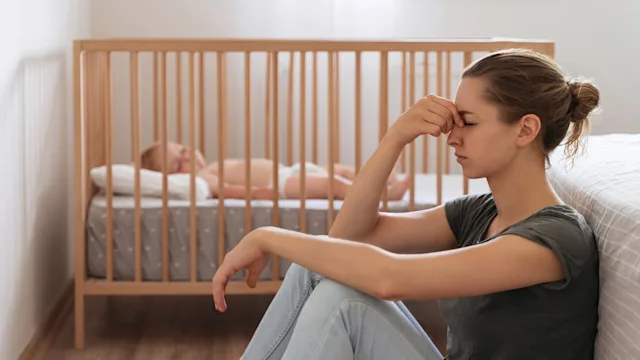Key takeaways:
Stress, anxiety, and depression can affect your sex life. They’re linked to orgasm problems, erectile dysfunction, low libido, and more.
Medications that people take to treat anxiety and depression can cause sexual side effects too.
If you’re struggling with depression, anxiety, or problems in your sex life, talk to a healthcare professional. Treatment can help.
If you’ve ever felt stressed, anxious, or depressed, you’re not alone. After all, these conditions affect millions of people in the U.S. every year. And here’s the hard truth: When you’re not feeling well mentally, it can affect your sex life too.
In this article, we’ll explore the link between mental and sexual health. We’ll also discuss common reasons for sexual problems — including erectile dysfunction (ED). And we’ll share some ideas for treatment.
How do depression, anxiety, and stress affect your sex life?
Stress, depression, and anxiety can affect your sexual health in many ways. After all, your mental, physical, and sexual health are closely connected.
Search and compare options
If you’re struggling mentally, here are some things that you might notice:
Low libido: You might have a low libido (sex drive), which means you’re less interested in sex.
Physical problems: These could be problems with erections, ejaculation, or orgasm. You might also have a hard time getting physically aroused, or “turned on.”
Less pleasurable sex: Depression and anxiety can make you feel bad about yourself, and they can make it harder to communicate with your partner. These issues might make sex less enjoyable overall.
Fertility issues: Stress can affect sperm health and a woman’s ability to conceive.
Let’s take a closer look at some specific situations.
Can depression and anxiety cause erectile dysfunction?
Yes. Anxiety and depression can both contribute to erectile dysfunction (also known as ED, or impotence). When you’re feeling anxious, sad, or irritable, it can be hard to get in the mood for sex. These feelings can also make erections go away if you have one.
Symptoms of ED (impotence) include:
Difficulty having an erection
Difficulty maintaining an erection
Having an erection that’s too soft for penetration
Losing your erection too soon after penetration
Feeling like sex is less satisfying or pleasurable
Common causes of erectile dysfunction (ED): Read about the top 11 causes of ED, including mental health conditions.
Is there Viagra for women? Learn more about medications for treating sexual problems in women.
Looking for a better sex life? Check out these 11 science-based tips for giving your sex life a boost.
Sometimes, the cause of ED is depression or anxiety. Other times, ED can make your mental health worse. It can be a cycle that feels hard to control. You may even start to worry ahead of time about your ability to have an erection (performance anxiety). Working with a healthcare professional is one way to end this pattern.
Can stress cause erectile dysfunction?
Yes. When you experience ongoing stress, your body can release cortisol. Cortisol is a hormone that constricts the blood vessels in your penis. When blood can’t flow properly to your penis, you may have difficulty achieving an erection.
Over time, chronic stress can also decrease the amount of testosterone your body makes. And low testosterone is linked to ED. Low testosterone is also common in people with mental health issues like depression and anxiety.
Read more like this
Explore these related articles, suggested for readers like you.
Can anxiety or depression affect your orgasms?
Yes. An orgasm is often the climax of sexual excitement. For many people, orgasm happens during or at the end of a sexual activity — like penetration, masturbation, or sensual massage. To be able to have an orgasm, your body and brain usually have to work together.
Feeling depressed, anxious, or stressed can make it harder for your brain and body to coordinate well. You may have trouble getting physically aroused. Or you might be more preoccupied during sex and feel less connected to your partner. And some people with depression and anxiety find sex less pleasurable, or even painful.
When all of these combine, an orgasm can be harder to achieve or less enjoyable when it does happen.
Can antidepressants cause ED and other sexual problems?
Yes. Antidepressants are used to treat anxiety and depression. Unfortunately, many can also have sexual side effects, like low libido, problems with orgasm, and changes in ejaculation.
Common medications with sexual side effects include:
Selective serotonin reuptake inhibitors (SSRIs): like fluoxetine, sertraline, and especially paroxetine
Serotonin and norepinephrine reuptake inhibitors (SNRIs): like venlafaxine and duloxetine
Tricyclic antidepressants (TCAs): like amitriptyline, imipramine, and doxepin
But these antidepressants are less likely to cause sexual side effects:
Bupropion (Wellbutrin)
Mirtazapine (Remeron)
Vortioxetine (Trintellix)
Vilazodone (Viibryd)
Selegiline (Emsam)
If you’re taking an antidepressant and having sexual problems, talk to your healthcare team. It may be possible to lower the dose of your medication or switch to another one. Your prescriber might also suggest adding another medication to help.
What can you do if you’re having trouble in your sex life?
One of the best things you can do if you're having trouble with sex is to talk to a healthcare professional. It can feel hard to bring up sex. But remember: They’re there to help. After all, your sexual health is an important part of you.
Check your general physical health
First of all, it’s a good idea to get a general checkup. Many sexual problems are linked to physical (not psychological) conditions, so it’s important to make sure your body is healthy. A health problem might be affecting your sexual abilities.
Treat your depression or anxiety
If you have depression or anxiety, getting treatment can also help with your sexual problems. Here are the two top treatments for mental health:
Therapy: This is a great first-choice option for both depression or anxiety.
Medications: Many people get help with medications.
Both therapy and medications can make a huge difference in your quality of life — including your sex life. And keep in mind: Many antidepressant and anti-anxiety medications take about 4 to 6 weeks to really start working. So don’t get discouraged if you’re not feeling any changes in your mental health right away.
Finally, remember that many medications for depression and anxiety can actually cause sexual side effects. Keep your healthcare team in the loop, so they can adjust (or stop) your medication if needed.
Treat your sexual problems directly
In some cases, you may need specialized treatment for a sexual problem. Fortunately, there are a lot of great options.
Medications can directly help with:
Problems related to the menopause transition
Vaginal dryness and pain
Physical treatments can help too. This might mean working with a physical therapist, using vaginal dilators, or doing Kegel exercises. In some cases, surgery or implants can also work well for ED. And there are even sex therapists who specialize in sexual health problems.
Frequently asked questions
It’s hard to say. A 2025 study found that having sex 1 to 2 times per week might help lower your risk of depression. And another study from 2024 found that people who never had sex were more likely to feel lonely and unhappy.
But in reality, there’s no “right or wrong” amount of sex to have for your happiness. After all, everyone is different. Some people enjoy having a lot of sex. Other people are less interested in sex, or they might be asexual. What really matters is what feels right for you as an individual.
Viagra (sildenafil) is a medication that’s used for ED. Though Viagra isn’t currently used to treat depression directly, there’s some evidence that it might actually have some antidepressant effects.
In the meantime, Viagra may be able to help you feel better about your sex life. And feeling better about sex can potentially help you feel less sad or depressed too.
It’s unlikely. Depression usually causes a low sex drive (low libido), not a higher sex drive.
It’s hard to say. There haven’t been any good studies on sex as a treatment for depression and anxiety. But there’s definitely evidence that consensual, pleasurable sex can be good for your mental health.
It’s hard to say. A 2025 study found that having sex 1 to 2 times per week might help lower your risk of depression. And another study from 2024 found that people who never had sex were more likely to feel lonely and unhappy.
But in reality, there’s no “right or wrong” amount of sex to have for your happiness. After all, everyone is different. Some people enjoy having a lot of sex. Other people are less interested in sex, or they might be asexual. What really matters is what feels right for you as an individual.
Viagra (sildenafil) is a medication that’s used for ED. Though Viagra isn’t currently used to treat depression directly, there’s some evidence that it might actually have some antidepressant effects.
In the meantime, Viagra may be able to help you feel better about your sex life. And feeling better about sex can potentially help you feel less sad or depressed too.
It’s unlikely. Depression usually causes a low sex drive (low libido), not a higher sex drive.
It’s hard to say. There haven’t been any good studies on sex as a treatment for depression and anxiety. But there’s definitely evidence that consensual, pleasurable sex can be good for your mental health.
The bottom line
When it comes to sex, your mental health plays a big role. If you’re feeling depressed, anxious, or stressed, it can make it difficult to enjoy sexual activities. It can also make it harder to orgasm, have an erection, or feel like having sex.
Talk to a healthcare professional if you’re facing challenges in your sex life — especially if you have depression or anxiety. After all, both your mental health and sexual health are important parts of your overall health and happiness.

Why trust our experts?


References
Abdellaoui, A., et al. (2024). Life without sex: Large-scale study links sexlessness to physical, cognitive, and personality traits, socioecological factors, and DNA. medRxiv.
Al-Kuraishy, H. M., et al. (2023). Sildenafil and depression: True or false prophecy. Neuroscience and Therapeutics.
American Psychological Association. (2024). Stress effects on the body.
Basson, R., et al. (2018). Women’s sexual dysfunction associated with psychiatric disorders and their treatment. Women’s Health.
Chen, M., et al. (2025). Optimal sexual frequency may exist and help mitigate depression odds in young and middle-aged U.S. citizens: A cross-sectional study. Journal of Affective Disorders.
International Society for Sexual Medicine. (n.d.). What is sexual performance anxiety and how can one manage it?
LaMotte, S. (2018). 10 health benefits of having more sex. CNN.
Liu, Q., et al. (2018). Erectile dysfunction and depression: A systematic review and meta-analysis. The Journal of Sexual Medicine.
National Health Service. (2023). Symptoms - depression in adults.
Rivas, A. M., et al. (2014). Diagnosing and managing low serum testosterone. Baylor University Medical Center Proceedings.
Velurajah, R., et al. (2021). Erectile dysfunction in patients with anxiety disorders: A systematic review. International Journal of Impotence Research.
















